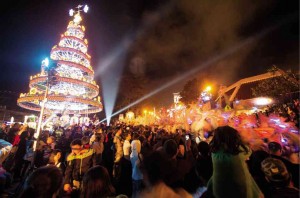BACOOR CITY, Cavite—At least 200 soldiers from the Philippine Army’s 2nd and 7th Infantry Divisions will be pulling out from typhoon-ravaged Leyte as the Yolanda-hit areas begin to show signs of normalcy.
Maj. Angelo Guzman, deputy public affairs officer of the Armed Forces of the Philippines (AFP), said on Thursday that the units to be pulled out were among some 3,000 soldiers from the Philippine Army, Navy and Air Force who were sent to the Visayas as augmentation forces to perform vital services such as search and retrieval operations, medical missions and relief operations for victims of Supertyphoon “Yolanda.”
He said most of the 200 soldiers had been temporarily based in Tacloban City and originally sent there to help keep order in the city amid an orgy of looting that followed the storm.
The 2nd ID soldiers sent to Leyte came from the Southern Tagalog or Calabarzon (Cavite, Laguna, Batangas, Rizal and Quezon) region while those from the 7th ID came from Central Luzon, Guzman said.
He added soldiers sent to Leyte could now be pulled out since residents, particularly those in Tacloban, have started to recover just as rebuilding and rehabilitation efforts of the government have began to intensify.
Not all AFP personnel in Yolanda-hit areas would, however, be pulled out after the recall of the 200 soldiers, said Guzman.
Other units, the engineering battalions in particular, will be required to stay for an indefinite period in Leyte, or until rebuilding efforts are over, said Guzman.
After Yolanda hit the country, Army divisions in areas which were not affected by Yolanda sent 100 soldiers each to Visayas, especially to Leyte and Samar, he said.
Social Welfare Secretary Corazon “Dinky” Soliman said in a press conference held at the National Disaster Risk Reduction and Management Council (NDRRMC) in Camp Aguinaldo on Wednesday that the government is now giving more emphasis to rehabilitation efforts in the Visayas.
Aside from rebuilding homes and infrastructure, the government is also focusing on stress debriefing of Yolanda survivors administered by trained DSWD personnel.


